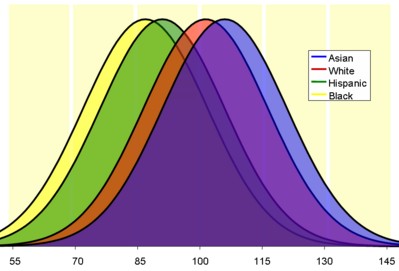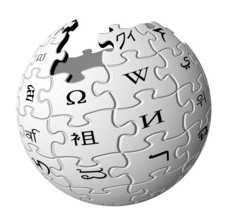Intelligence, language and WikiPedia - is there a relationship?
 The fact that a person’s intellect depends on his skin color or, more precisely, on race has already been checked and proved more than once by both scientific experiments and the most objective expert in this matter - the history of Man himself. So, according to scientific studies, the average IQ for Asians is about 106, for whites - about 100, for blacks - from 85 in the United States to 70 in the region of the so-called Black Africa.
The fact that a person’s intellect depends on his skin color or, more precisely, on race has already been checked and proved more than once by both scientific experiments and the most objective expert in this matter - the history of Man himself. So, according to scientific studies, the average IQ for Asians is about 106, for whites - about 100, for blacks - from 85 in the United States to 70 in the region of the so-called Black Africa. Such results were obtained, despite the fact that IQ tests were originally developed by white and for white.
The genetic architecture of IQ is approximately the same for all races and mainly depends on heredity.
 Researchers who examined a certain number of twins of the Negroid, Mongoloid, and Caucasoid races came to the conclusion that hereditary factors account for 50% of the weight in the formation of intelligence. The remaining 50% of those responsible for the formation of intelligence are external factors. One of which is language. It is the language that our further quasi-research will be devoted to.
Researchers who examined a certain number of twins of the Negroid, Mongoloid, and Caucasoid races came to the conclusion that hereditary factors account for 50% of the weight in the formation of intelligence. The remaining 50% of those responsible for the formation of intelligence are external factors. One of which is language. It is the language that our further quasi-research will be devoted to. As the initial data array for the study, we take statistics on the number of articles published in WikiPedia in various languages over the past 5 years.
| 2009 | 2010 | 2011 | 2012 | 2013 | The relative increase in the number of articles over 5 years has increased | The absolute increase in the number of articles over 5 years has increased | |
| English articles, thousands | 2847 | 3290 | 3645 | 3907 | 4230 | 1.49 | 1383 |
| German, thousand | 894 | 1066 | 1236 | 1383 | 1580 | 1.77 | 686 |
| French, thousand | 792 | 947 | 1106 | 1230 | 1380 | 1.74 | 588 |
| Italian, thousand | 560 | 687 | 803 | 905 | 1030 | 1.84 | 470 |
| Spanish, thousand | 465 | 596 | 761 | 879 | 1010 | 2.17 | 545 |
| Russian, tyss | 380 | 534 | 714 | 838 | 1000 | 2.63 | 620 |
The study will be conducted on the example of the main languages of the white race for several reasons. Firstly, the white race shows an average IQ between Negroids and Mongoloids. Secondly, China, as the main representative of the Mongoloid race since 2004, has been blocking its users access to WikiPedia, and therefore, its numbers will not be objective enough. Thirdly, representatives of the black race are represented on the web in a completely non-representative volume.
As can be seen from the table, the absolute record holder for the number of published articles is English. This, literally, outstanding result is due not only to the fact that English is the third most widely spoken language in the world after Chinese and Spanish ( 1), but also the official language for all scientific papers applying for international recognition. This fact should be taken into account when analyzing numbers.
 The presence in the table in the second and third positions of German and French, respectively, indicates that, despite the insignificant distribution compared to English, these languages account for a significant part of the articles. This indicates a high intellectual potential of native speakers of this language. Indirect confirmation of this statement can be found in the fact that the economies of Germany and France act as locomotive for the entire European Union. And products manufactured in the same Germany are a kind of quality standard, and this is true not only in relation to the automotive industry, but also in other high-tech sectors of the economy.
The presence in the table in the second and third positions of German and French, respectively, indicates that, despite the insignificant distribution compared to English, these languages account for a significant part of the articles. This indicates a high intellectual potential of native speakers of this language. Indirect confirmation of this statement can be found in the fact that the economies of Germany and France act as locomotive for the entire European Union. And products manufactured in the same Germany are a kind of quality standard, and this is true not only in relation to the automotive industry, but also in other high-tech sectors of the economy.At the same time, Russian, which is superior in prevalence of German and French combined, accounts for ~ 1.5 times fewer articles than French or German separately. Based on this fact, we can draw a corresponding conclusion about the intellectual potential of native speakers of this language. This conclusion is confirmed by analyzing the state of science, economics and industry of countries for which this language is official.
Thus, it can be argued that such an indicator as the number of articles published in WikiPedia can act as a specific criterion for assessing the intellectual maturity of native speakers of this language and the development of their science, economy and industry.
Developing the topic, you can transform the first table by adding columns with numbers reflecting the dynamics of increasing the number of articles in each language and see the following dependencies:
| Language Articles | 2009 | 2010 | Delta 2010 | 2011 | Delta 2011 | 2012 | Delta 2012 | 2013 | Delta 2013 |
| English | 2847 | 3290 | 16% | 3645 | eleven% | 3907 | 7% | 4230 | 8% |
| German | 894 | 1066 | 19% | 1236 | 16% | 1383 | 7% | 4230 | 8% |
| French | 792 | 947 | 20% | 1106 | 17% | 1230 | eleven% | 1380 | 12% |
| Italian | 560 | 687 | 23% | 803 | 17% | 905 | thirteen% | 1030 | 14% |
| Spanish | 465 | 596 | 28% | 761 | 28% | 879 | 16% | 1010 | fifteen% |
| Russian | 380 | 534 | 41% | 714 | 34% | 838 | 17% | 1000 | 19% |
- The smaller the absolute number of articles in a particular language, the more intense the dynamics of their growth over the years. Those. the number of articles depends not only on the intelligence of the native speakers, but also on the degree of coverage of the carriers with access to the Web. It is obvious that in the CIS countries, which are the main native speakers of the Russian language, mass coverage of the network began only in the last 5 years, hence such outstanding indicators of the increase in the number of articles.
- In the long run, the number of articles in the main 4-6 languages (minus English) should stabilize around a certain constant value of ± 2-3%. Obviously, as the number of articles in a certain language grows, the average intelligence of native speakers of that language also grows, and science, economics, and production develop.
Based on the foregoing, two conclusions can be drawn. The first and unconditional - WikiPedia is not only a carrier of a huge stock of information and knowledge in many languages, but also itself acts as a generator for new / derived knowledge and information. The second is not unconditional, but extremely fair - speakers of several basic languages have a higher intelligence score, respectively, the presence of two or more official languages in the country contributes not only to an increase in the rate of intellectual development, but also to the development of science, economy and / or industry.
